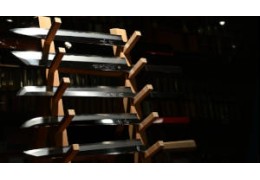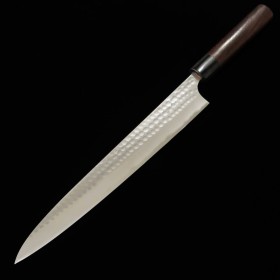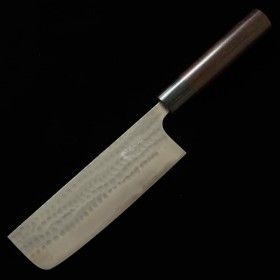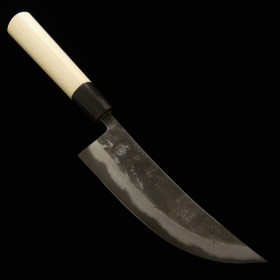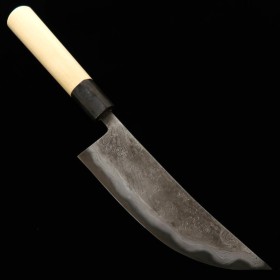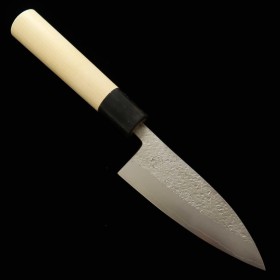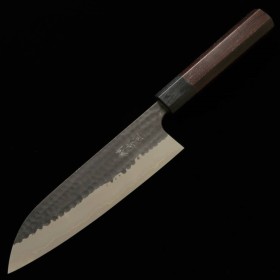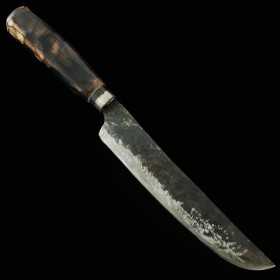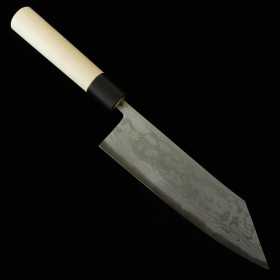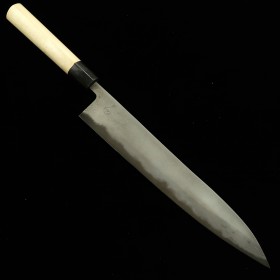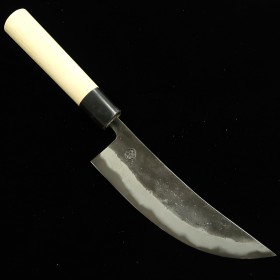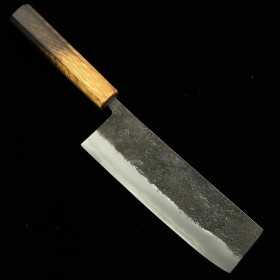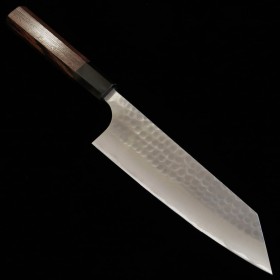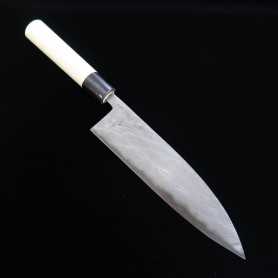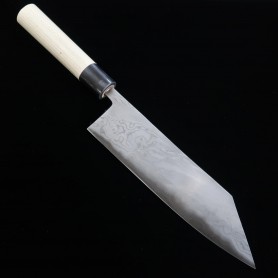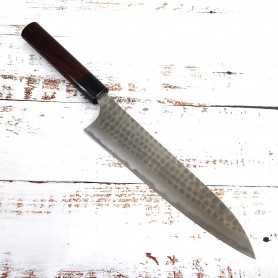japanese knife
There are 39 products.
Japanese BBQ knife Nikukiri - MIYAZAKI KAJIYA - Blue steel No.2 - Damascus - Kurouchi - Size : 18cm
Out-of-Stock
"Miyazaki Kajiya" is located in Goto islands, Nagasaki Prefecture, a city rich in nature, and its knives are made entirely by hand. The craftsman, Haruo Miyazaki, is the third generation of the Oba blacksmith family from Fukuoka Prefecture. He had been trained for five years under Toshio Oba, a master craftsman who forged the traditional "Hakata Ippon Hocho”. He makes knives with the wildness that only a field smith can create, including the Tsubaki knife, which has a unique shape similar to the Hakata knife.
Japanese BBQ knife Nikukiri - MIYAZAKI KAJIYA - White steel No.2 - Damascus - Kurouchi - Size: 18cm
Out-of-Stock
"Miyazaki Kajiya" is located in Goto islands, Nagasaki Prefecture, a city rich in nature, and its knives are made entirely by hand. The craftsman, Haruo Miyazaki, is the third generation of the Oba blacksmith family from Fukuoka Prefecture. He had been trained for five years under Toshio Oba, a master craftsman who forged the traditional "Hakata Ippon Hocho”. He makes knives with the wildness that only a field smith can create, including the Tsubaki knife, which has a unique shape similar to the Hakata knife.
Japanese Petty knife - MIYAZAKI KAJIYA - Stainless Ginsan steel - Hammered - Magnolia wooda handle - Size :
Out-of-Stock
"Miyazaki Kajiya" is located in Goto islands, Nagasaki Prefecture, a city rich in nature, and its knives are made entirely by hand. The craftsman, Haruo Miyazaki, is the third generation of the Oba blacksmith family from Fukuoka Prefecture. He had been trained for five years under Toshio Oba, a master craftsman who forged the traditional "Hakata Ippon Hocho”. He makes knives with the wildness that only a field smith can create, including the Tsubaki knife, which has a unique shape similar to the Hakata knife.
¥21,040
Japanese Chef knife Gyuto - MIYAZAKI KAJIYA - Super Blue Carbon steel - Kurouchi - Magnlolia wood handle - Size : 24/25cm
Out-of-Stock
"Miyazaki Kajiya" is located in Goto islands, Nagasaki Prefecture, a city rich in nature, and its knives are made entirely by hand. The craftsman, Haruo Miyazaki, is the third generation of the Oba blacksmith family from Fukuoka Prefecture. He had been trained for five years under Toshio Oba, a master craftsman who forged the traditional "Hakata Ippon Hocho”. He makes knives with the wildness that only a field smith can create, including the Tsubaki knife, which has a unique shape similar to the Hakata knife.
Japanese Extra Thick Gyuto - MIYAZAKI KAJIYA - White steel NO.2 - Kurouchi Finish - Magnlolia wood handle - Size : 24cm
Out-of-Stock
"Miyazaki Kajiya" is located in Goto islands, Nagasaki Prefecture, a city rich in nature, and its knives are made entirely by hand. The craftsman, Haruo Miyazaki, is the third generation of the Oba blacksmith family from Fukuoka Prefecture. He had been trained for five years under Toshio Oba, a master craftsman who forged the traditional "Hakata Ippon Hocho”. He makes knives with the wildness that only a field smith can create, including the Tsubaki knife, which has a unique shape similar to the Hakata knife.
Japanese Petty Knife - KANIMAN KAJI KOUBOU - Leaf Spring CarbonSteel - Black Finish - Size:9cm
Out-of-Stock
"Kaniman" is an old Okinawan word meaning “blacksmith” or “one who is involved with iron.” We produce blades that fit modern life based on traditional blades from the southern islands.Steel materials are selected from scrap wood or special steel for blades depending on the blade's purpose, and handles are often made of Okinawan wood.Shima knives - knives that were used in the historical climate of Okinawa, designed to be light and short to fit modern kitchen conditions.
Japanese Petty Knife - KANIMAN KAJI KOUBOU Leaf Spring CarbonSteel - Black Finish - Size:9cm
Out-of-Stock
"Kaniman" is an old Okinawan word meaning “blacksmith” or “one who is involved with iron.” We produce blades that fit modern life based on traditional blades from the southern islands.Steel materials are selected from scrap wood or special steel for blades depending on the blade's purpose, and handles are often made of Okinawan wood.Shima knives - knives that were used in the historical climate of Okinawa, designed to be light and short to fit modern kitchen conditions.
Japanese Santoku Knife - KanimanKajiKobo- ShimaKnife(double-edged blade)-White Carbon Steel No.2 - Black Finish - size:20cm
Out-of-Stock
"Kaniman" is an old Okinawan word meaning “blacksmith” or “one who is involved with iron.” We produce blades that fit modern life based on traditional blades from the southern islands.Steel materials are selected from scrap wood or special steel for blades depending on the blade's purpose, and handles are often made of Okinawan wood.Shima knives - knives that were used in the historical climate of Okinawa, designed to be light and short to fit modern kitchen conditions.
Japanese Sujihiki Knife -Miyazaki Kajiya- Carbon Blue No2 Soft Iron Clad Damascus -Water quenching– Tsubaki – Size:27cm
Out-of-Stock
"Miyazaki Kajiya" is located in Goto islands, Nagasaki Prefecture, a city rich in nature, and its knives are made entirely by hand. The craftsman, Haruo Miyazaki, is the third generation of the Oba blacksmith family from Fukuoka Prefecture. He had been trained for five years under Toshio Oba, a master craftsman who forged the traditional "Hakata Ippon Hocho”. He makes knives with the wildness that only a field smith can create, including the Tsubaki knife, which has a unique shape similar to the Hakata knife.
Japanese BBQ Knife - MIYAZAKI KAJIYA - Tsubaki - Aogami No2. -Soft iron clad -Back Finish- Kurigata Magnolia Handle - Size:18cm
Out-of-Stock
"Miyazaki Kajiya" is located in Goto islands, Nagasaki Prefecture, a city rich in nature, and its knives are made entirely by hand. The craftsman, Haruo Miyazaki, is the third generation of the Oba blacksmith family from Fukuoka Prefecture. He had been trained for five years under Toshio Oba, a master craftsman who forged the traditional "Hakata Ippon Hocho”. He makes knives with the wildness that only a field smith can create, including the Tsubaki knife, which has a unique shape similar to the Hakata knife.
Japanese Nakiri Knife - MIYAZAKI KAJIYA – Tsubaki ― Aogami No2. -soft iron clad - Oakwood handle - Size:18cm
Out-of-Stock
"Miyazaki Kajiya" is located in Goto islands, Nagasaki Prefecture, a city rich in nature, and its knives are made entirely by hand. The craftsman, Haruo Miyazaki, is the third generation of the Oba blacksmith family from Fukuoka Prefecture. He had been trained for five years under Toshio Oba, a master craftsman who forged the traditional "Hakata Ippon Hocho”. He makes knives with the wildness that only a field smith can create, including the Tsubaki knife, which has a unique shape similar to the Hakata knife.
¥20,900
Japanese Chef Gyuto knife - MIYAZAKI KAJIYA - Hryugata - Damascus - Hon warikomi carbon super blue steel 21cm
Out-of-Stock
"Miyazaki Kajiya" is located in Goto City, Nagasaki Prefecture, a city rich in nature, and its knives are made entirely by hand.
The craftsman, Haruo Miyazaki, is the third generation of the Oba blacksmith family from Fukuoka Prefecture. He had been trained for five years under Toshio Oba, a master craftsman who forged the traditional "Hakata Ippon Hocho”. He makes knives with the wildness that only a field smith can create, including the Tsubaki knife, which has a unique shape similar to the Hakata knife.
The craftsman, Haruo Miyazaki, is the third generation of the Oba blacksmith family from Fukuoka Prefecture. He had been trained for five years under Toshio Oba, a master craftsman who forged the traditional "Hakata Ippon Hocho”. He makes knives with the wildness that only a field smith can create, including the Tsubaki knife, which has a unique shape similar to the Hakata knife.
Japanese tsubaki knife - MIYAZAKI KAJIYA - Hryugata - Damascus - Hon warikomi carbon super blue steel - Size:21cm
Out-of-Stock
"Miyazaki Kajiya" is located in Goto City, Nagasaki Prefecture, a city rich in nature, and its knives are made entirely by hand.
The craftsman, Haruo Miyazaki, is the third generation of the Oba blacksmith family from Fukuoka Prefecture. He had been trained for five years under Toshio Oba, a master craftsman who forged the traditional "Hakata Ippon Hocho”. He makes knives with the wildness that only a field smith can create, including the Tsubaki knife, which has a unique shape similar to the Hakata knife.
The craftsman, Haruo Miyazaki, is the third generation of the Oba blacksmith family from Fukuoka Prefecture. He had been trained for five years under Toshio Oba, a master craftsman who forged the traditional "Hakata Ippon Hocho”. He makes knives with the wildness that only a field smith can create, including the Tsubaki knife, which has a unique shape similar to the Hakata knife.

